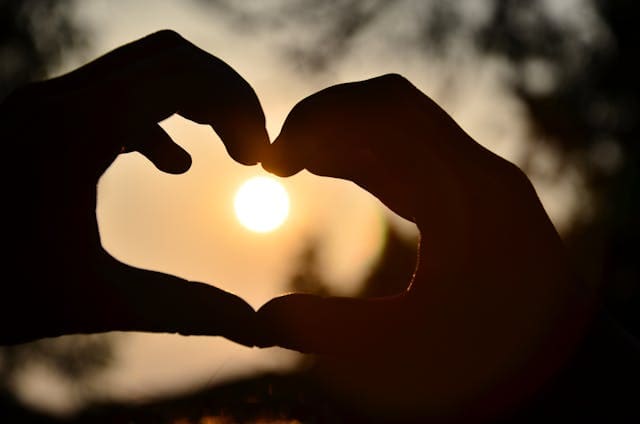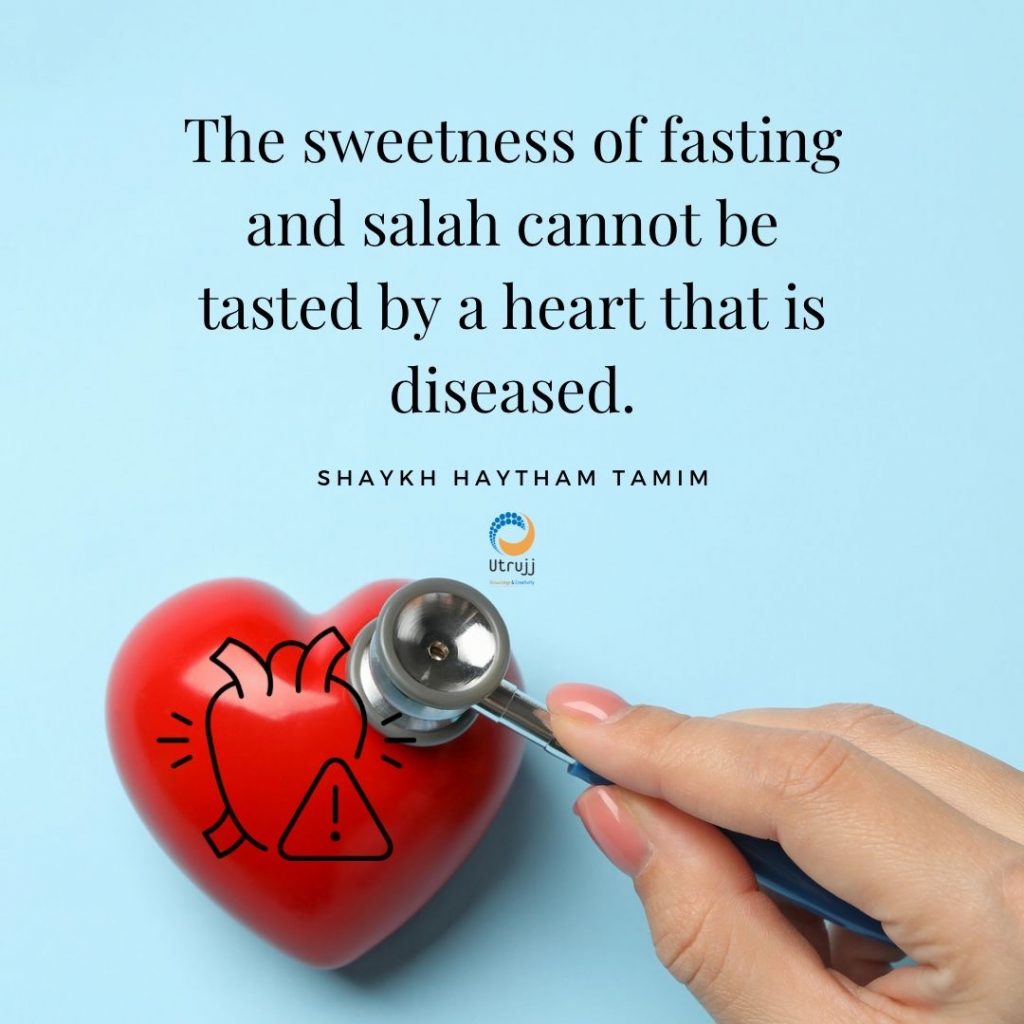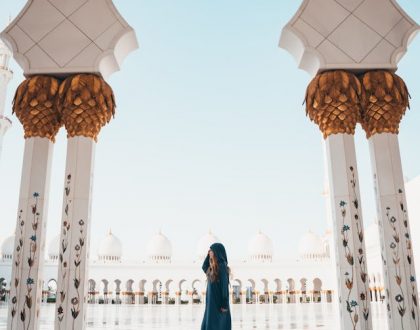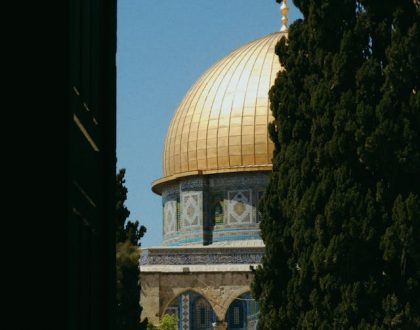Prepare your heart for Ramadan

The fortunate amongst us will live to receive Ramadan – due to illness or death. We ask Allah to enable us to receive Ramadan with good health and high imaan. Every year we have Ramadan, so what is the best way to receive it. This year I want to reflect on the state of our hearts when we enter Ramadan.
Our faculties
Allah created everything with a purpose. Allah created each of our faculties for a reason, like our eyes, they see truth, beauty and the magnificence of Allah’s creation. Our ears enable us to hear good things and His words and truth. Our tongues enable us to speak, recite the Quran and taste things. When you lose the sense of taste, everything tastes bland. The purpose is lost. Your nose smells fragrance. Your skin enables you sense of touch. Without it you would not feel heat or cold or pain or any sensation and you could get hurt.

Our heart
The physical heart pumps blood around our body and keeps us alive. But the heart has a different dimension. The spiritual heart acts as a receptor for signals from Allah, receiving His light, mercy, and blessings. Just as a sick tongue fails to discern flavours, an impaired spiritual heart becomes numb, unable to perceive light or experience spiritual sensations. When the heart is numb, the richness of Ramadan, including the sweetness of qiyam, fasting, and worship, remains elusive—much like the experience of one suffering from a severe flu. Therefore, our aim is to prepare our hearts for Ramadan.
A pure heart resembles a polished mirror, brilliantly reflecting divine light, while a dusty heart obscures it. The Quran talks about the heart many times when Ibrahim (peace be upon him) makes dua to Allah:
وَلَا تُخۡزِنِی یَوۡمَ یُبۡعَثُونَ ٨٧
and do not put me to disgrace on the Day when all will be raised to life, [Ash-Shuʿarāʾ, Ayah 87]
یَوۡمَ لَا یَنفَعُ مَالࣱ وَلَا بَنُونَ ٨٨
the Day when neither wealth will be of any use (to any one) nor sons, [Ash-Shuʿarāʾ, Ayah 88]
إِلَّا مَنۡ أَتَى ٱللَّهَ بِقَلۡبٍ سَلِیم٨٩
except to him who will come to Allah with a sound heart, [Ash-Shuʿarāʾ, Ayah 89]
These verses tell us that on the Day of Judgement no one will benefit you or support you. The only thing that will benefit you is a sound heart.
In the very famous and oft-quoted hadith, the Prophet (peace be upon him) said:
ألا وإن في الجسد مضغة إذا صلحت صلح الجسد كله وإذا فسدت فسد الجسد كله ألا وهي القلب. متفق عليه.
Verily, there is a piece of flesh in the body, if it is healthy, the whole body is healthy, and if it is corrupt, the whole body is corrupt. Verily, it is the heart.” [Bukhari and Muslim].
If the heart is sound, the body is sound and the actions are sound, but if the heart is corrupt the body is corrupt and the actions are corrupt. This shows that inside or outside of Ramadan, a diseased heart has serious implications for the whole body. In Ramadan, the soundness of the heart will have a big impact on the character, the quality of the deeds and the ibadah.
Al-Hasan al Basri one of the tabieen (the generation of Muslims who succeeded the Companions of the Prophet (peace be upon him) and lived during the period immediately after the time of the Prophet (peace be upon him) said:
“Tend to your heart, for Allah’s need from His servants is the righteousness of their hearts.”
This means that what Allah desires from His servants is the righteousness of their hearts, because this makes you closer to Him.
In the last year of his life, the Messenger of Allah (ﷺ) said as part of his last and important pieces of advice to his beloved Ummah:
وَلَا تَحَاسَدُوا وَلَا تَبَاغَضُوا وَلَا تَقَاطَعُوا وَلَا تَدَابَرُوا وَكُونُوا إِخْوَانًا كَمَا أَمَرَكُمْ اللَّهُ تَعَالَى. مسند أحمد.
Do not envy one another, do not bear grudges against one another, do not sever ties with one another, do not turn away from one another; be brothers as Allah has commanded you.” [Musnad Ahmad]
In order to have a sound heart you have to resolve issues with those around you and clear our hearts of the diseases of the heart, these include arrogance, envy and hatred. You need to resolve things between you and Allah and you and the people around you. Arrogance, and having a feeling of superiority over others prevents you from coming close to Allah, being loved by Him and being loved by others. We need to check our hearts for these diseases. Some of us have more than others.
The pure heart
‘Abdullah bin ‘Amr (may Allah be pleased with him) said:
عَنْ عَبْدِ اللَّهِ بْنِ عَمْرٍو، قَالَ قِيلَ لِرَسُولِ اللَّهِ ـ صلى الله عليه وسلم ـ أَىُّ النَّاسِ أَفْضَلُ؟ قَالَ :” كُلُّ مَخْمُومِ الْقَلْبِ، صَدُوقِ اللِّسَانِ ” . قَالُوا: صَدُوقُ اللِّسَانِ نَعْرِفُهُ، فَمَا مَخْمُومُ الْقَلْبِ؟ قَالَ: ” هُوَ التَّقِيُّ النَّقِيُّ، لاَ إِثْمَ فِيهِ وَلاَ بَغْىَي وَلاَ غِلَّ وَلاَ حَسَدَ ” . ابن ماجه.
It was said to the Messenger of Allah (ﷺ): ‘Which of the people is best?’ He said: ‘Everyone who is pure of heart and sincere in speech.’ They said: ‘Sincere in speech, we know what this is, but what is pure of heart?’ He said: ‘It is (the heart) that is pious and pure, with no sin, injustice, rancor or envy in it.’” [Ibn Majah]
Piety is having taqwa, which is to fulfil your obligations, refrain from everything that has been prohibited and do what is recommended and avoid doubtful matters. The purity of the heart comes from avoiding sins, hatred and envy. This is the prescription to mend your heart. It is not just before Ramadan, but something we need to maintain throughout the year.
Dua of the righteous
If you have had a fight with someone, resolve it before Ramadan, otherwise your heart will be heavy. If you want light to fill your heart, you need to prepare it. In the Quran, in Surat Al-Hashr, Allah described the dua of righteous people.
وَٱلَّذِينَ جَآءُو مِنۢ بَعۡدِهِمۡ يَقُولُونَ رَبَّنَا ٱغۡفِرۡ لَنَا وَلِإِخۡوَٰنِنَا ٱلَّذِينَ سَبَقُونَا بِٱلۡإِيمَٰنِ وَلَا تَجۡعَلۡ فِي قُلُوبِنَا غِلّٗا لِّلَّذِينَ ءَامَنُواْ رَبَّنَآ إِنَّكَ رَءُوفٞ رَّحِيمٌ
And those who came after them say: “Our Lord! Forgive us and our brethren who have preceded us in Faith, and put not in our hearts any hatred against those who have believed. Our Lord! You are indeed full of kindness, Most Merciful. [59:10]
We need to repeat this dua over and over again, Wa La taj’al fi qulubina ghillan lilladheena aamanu:
وَلَا تَجۡعَلۡ فِي قُلُوبِنَا غِلّٗا لِّلَّذِينَ ءَامَنُواْ
Conflicts darken the heart
When you have a conflict with someone, Shaytan instantly plants rancour in your heart against them. The first you have to do is plead to Allah not to allow this to take root. We should recite this Aya at the end of every salah. Add it to your dua list.
Ask for a sound heart
One of the supplications of Prophet Muhammad (peace be upon him) was for a qalban Saleeman:
اللهم إني أسألك قلباً سليماً. مسند أحمد وابن حِبان.
“And I ask You for a sound heart.” [Imam Ahmad and Ibn Hibban]
He already had the purest heart Allah ever created, but through this dua, he was teaching us how to make dua and focus our attention on our heart. If you lose your heart, you have lost your life, you may be walking and talking and breathing, but you are the walking dead, because you have lost your connection with Allah.
Prejudices and negativity
The Messenger of Allah (peace be upon him) also forbid his Companions from saying bad things about other Companions to him, he said:
قال الرسول صلى الله عليه وسلم ( لا يبلغني أحد عن أحد من أصحابي شيئاً، فإني أحب أن أخرج إليكم وأنا سليم الصدر ). أبو داود.
“Let none of you convey anything about any of my companions to me, for I like to come out to you while my heart is sound.” [Abu Dawoud]
Hearing criticisms about others predisposes us to feel negatively towards them. We need to train ourselves to not pre-judge others.
Among the things that diffuse hatred and rancour is something very simple but deep, which is to give gifts.
جاء في الحديث ( تهادَوا تحابوا ) رواه البخاري في الأدب المفرد وهو حديث حسن.
“Exchange gifts, as that will lead to increasing your love for one another.” [Bukhari in Al-Adab al-Mufrad]
It does not have to be an expensive gift, but it breaks down walls of envy and animosity when you exchange gifts and fosters love.
These are quick and easy tips, which should be done with the right intention – without expecting anything in return and as a means of expressing gratitude and love.
At a time when most people are preoccupied with outward appearances, neglecting the inner matters. Although Allah does not look at bodies and forms, but rather at hearts and deeds.
The hearts in Jannah
Allah Almighty described the people of Jannah in Surat al Hijr,
وَنَزَعۡنَا مَا فِی صُدُورِهِم مِّنۡ غِلٍّ إِخۡوَ ٰنًا عَلَىٰ سُرُرࣲ مُّتَقَـٰبِلِینَ ٤٧
We shall have removed whatever grudge they had in their hearts, (thus making them) brothers, sitting on couches, face to face. [Al-Ḥijr, Ayah 47]
The people of Jannah would not enjoy Jannah if people have animosity towards others in Jannah, so Allah will clear their hearts of all traces of bitterness or loathing – giving them a fresh heart that will be immune from negative feelings.
The soundness of the heart thus makes Jannah blissful. If we can achieve this in dunya it will make our life in dunya much happier, and improves or relationship with Allah and people. Those who are struggling from acrimonious relationships will have contamination in their hearts. They may say they are fine, but you can see that their hearts are not at ease.
Salah washes the heart
On a daily basis we interact with others, think about others, and plan things – each interaction impacts the heart. This is why we need to keep polishing our hearts and this is why Allah prescribed salah five times a day.
عَن جابر بن عبد الله رضي الله تعالى عنه قَالَ: قَالَ رَسُولُ اللَّهِ صَلَّى اللَّهُ عَلَيْهِ وَسَلَّمَ: ” أَرَأَيْتُمْ لَوْ أَنَّ نَهْرًا بِبَابِ أَحَدِكُمْ يَغْتَسِلُ فِيهِ كُلَّ يَوْمٍ خَمْسًا هَلْ يَبْقَى مِنْ دَرَنِهِ شَيْءٌ؟ قَالُوا: لَا يَبْقَى مِنْ دَرَنِهِ شَيْءٌ. قَالَ: فَذَلِكَ مَثَلُ الصَّلَوَاتِ الْخَمْسِ يَمْحُو اللَّهُ بِهِنَّ الْخَطَايَا “متفق عليه.
Jabir reported God’s Messenger as saying, “Tell me, if there were a river at the door of one of you in which he washed five times daily, would any of his filthiness remain?” When he received the reply that none of it would remain, he said, “That is like the five times of prayer by which God obliterates sins.” (Bukhari and Muslim).
When you perform salah properly it washes us and our hearts – through the process of wudu, the supplications after wudu, the opening of the salah, the salah, the istighfar and adhkar after the salah are all cleansing mechanisms.
With every salah we should have a fresh heart. As we return to our day, we might backbite or fall out with someone or feel envy and our heart will get dusty. Slowly we lose the light coming to the heart and you feel tightness in your chest, you feel angry or sad inside. If you want to reverse this you have to polish the heart.
Resolve issues
Ramadan is a good opportunity to clean your heart – it has a special cleansing agent which removes dirt, dust and contamination from our hearts, so we have to resolve any issues we have with Allah or with others. Ask for forgiveness if you have done something wrong. Ask Allah sincerely, and promise not to do it again. Ask Him to help you stay on the straight path, improve yourself and replace the bad deeds with good deeds. If you have wronged others or have issues with parents, siblings, in-laws, friends neighbours or colleagues etc, do your best to resolve them, as you feel lightness.
The Prophet (peace be upon him) used to do his daily istighfar a hundred times and recite the dua Sayid al Istighfar:
اللّٰهُمَّ أَنْتَ رَبِّي، لَا إِلٰهَ إِلَّا أَنْتَ، خَلَقْتَنِيْ وَأَنَا عَبْدُكَ، وَأَنَا عَلَى عَهْدِكَ وَوَعْدِكَ مَا اسْتَطَعْتُ، أَعُوْذُ بِكَ مِنْ شَرِّ مَا صَنَعْتُ، أَبُوءُ لَكَ بِنِعْمَتِكَ عَلَىَّ وَأَبُوءُ لَكَ بِذَنْبِيْ، فَاغْفِرْ لِيْ، فَإِنَّهُ لَا يَغْفِرُ الذُّنُوْبَ إِلَّاأَنْتَ۔ البخاري.
“O Allah! You are my Rabb. There is no true god except You. You have created me, and I am Your slave, and I hold to Your Covenant as far as I can. I seek refuge in You from the evil of what I have done. I acknowledge the favours that You have bestowed upon me, and I confess my sins. Pardon me, for none but You has the power to pardon”. Bukhari.
After salah, ask Allah for a sound heart. When you have a sound heart, your heart will function properly – thus it will deter you from sinning, because sins will make it feel uneasy. That is the sign of a healthy heart. When you do dhikr a sound heart will feel tranquility descend and mercy envelop you and this encourages you to do more dhikr. The more you prepare your heart, the more comfort you feel when you recite the Quran and feel the sweetness of your ibadah.
Siyam with the diseased heart is burdensome. You will feel tired and the fast will drag. With a sound heart, you feel happy to give zakat, otherwise you feel you don’t have much money. It does not feel like a chore or hardship. If you work on your heart all year round, you will be a different person.
Creating a strong society
Abu Hurayrah (may Allah be pleased with him) said that the Messenger of Allah (ﷺ) said,
وعن أبي هريرة رضي الله عنه أن رسول الله صلى الله عليه وسلم قال: ”إياكم والظن، فإن الظن أكذب الحديث، ولا تحسسوا، ولا تجسسوا ولا تنافسوا، ولا تحاسدوا، ولا تباغضوا، ولا تدابروا، وكونوا عباد الله إخوانًا كما أمركم. المسلم أخو المسلم، لا يظلمه، ولا يخذله ولا يحقره. التقوى ههنا، ” ويشير إلى صدره ”بحسب امرئ من الشر أن يحقر أخاه المسلم، كل المسلم على المسلم حرام: دمه، وعرضه، وماله، إن الله لا ينظر إلى أجسادكم، ولا إلى صوركم، ولكن ينظر إلى قلوبكم وأعمالكم”. رواه مسلم.
“Beware of suspicion, for suspicion is the worst of false tales. Do not look for other’s faults. Do not spy one another, and do not practice Najsh (means to offer a high price for something in order to allure another customer who is interested in the thing). Do not be jealous of one another and do not nurse enmity against one another. Do not sever ties with one another. Become the slaves of Allah, and be brothers to one another as He commanded. A Muslim is the brother of a Muslim. He should neither oppress him nor humiliate him. The piety is here! The piety is here!” While saying so he pointed towards his chest. “It is enough evil for a Muslim to look down upon his Muslim brother. All things of a Muslim are inviolable for his brother in Faith: his blood, his wealth and his honour. Verily, Allah does not look to your bodies nor to your faces but He looks to your hearts and your deeds.” [Muslim]
Islam seeks to harmonise and unite hearts among Muslims, to spread love and affection, and to eliminate enmity and discord. When we achieve this, we will be a stronger and more productive, supportive community.
Ibn Rajab said on the authority of some of the predecessors: The best deeds are soundness of chests, generosity of souls, and sincere advice to the people. With these qualities, he who attains high levels, and did not attain much diligence in fasting and prayer. Have you seen how the Prophet (peace be upon him) bore witness to one of his companions of Paradise, with the man testifying against himself that he does not pray extras but only the obligations? What is the secret to that?
Anas bin Malik (May Allah be pleased with him) said: We were sitting with the Messenger (peace be upon him) and he said:
A man from the people of Paradise will appear before you. Then a man from the Ansar appeared, his beard being cleaned from his ablution, his sandals hanging in his left hand…. However, I do not keep in my heart any deceit towards any of the Muslims, nor do I envy anyone for the goodness that God has given them. Abdullah said: This is what has elevated you, and it is what we cannot bear. [Ahmad]
Shaykh Haytham Tamim – 5th March 2024
- The consequences of harming Awliyaullah
- If you miss Isha and wake up at Fajr should you pray Isha (qada) or wait until after Fajr?
- Can you pray maghrib if it’s nearly Isha?
- If you wake up as the sun is rising should you pray Fajr?
- How late can pray Isha?
Recommended Posts

The consequences of harming Awliyaullah
May 03, 2024

Inspirational women in Islam
May 01, 2024

The forces of Allah and the fate of the falsifiers
April 26, 2024
